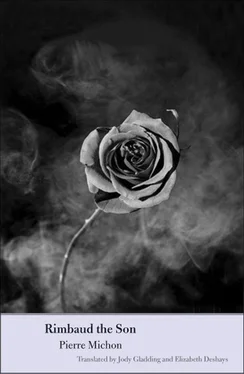Watteau’s Gilles wrote neoclassical nonsense; at least that is what is said of him today. But if in those times you had been a poet, a young poet, not quite Rimbaud of course but almost, if you too were tired of old-fashioned poetics, you would have turned the corner of boulevard Saint-Germain, heart pounding, into rue de Buci, where Banville lived; with his letter of encouragement in your pocket, which you had received in Douai or Confolens, affable as jam. You would have seen your hand tremble as it pushed open the carriage entrance of 10, rue de Buci; and in the depths of the cool, dark inner courtyard, filled with the sounds of the city though they seemed distant, like phantoms, you would have hesitated for a long time. You hesitate; you look up into the air, the mute windows of a great poet , and above the windows the month of June; because it is June, the four feet of that blue throne resting on the roofs. And at the same time as June, it is the evidence of poetic inanity that hits you; that is sitting on you, under which you are gasping for breath: because of course compared to June your pieces regarding June are pitiful; and without even considering June, which is very high and rebellious like Meaning, just considering language, the little corrupted code, the meager but inexhaustible hand with which meaning is made, not even meaning, the game of meaning, which has the air of a meaning, even compared to that, your poems hardly measure up; and your verses are far from true, powerless to translate what you are, the suffering void that you are, into pure prayer without waste. Into the language of June. No, nothing triumphs disproportionately in the poem, not June, not language, not you. So you flee, you are already at the gare d’Austerlitz, the evening trains are so beautiful when one is rid of the burden of having to speak about them.
But perhaps in that courtyard you do not flee: in June above a sparrow passes; you murmur for yourself alone one of those verses that are called perfect because they note the impossibility of recording all at once June, one’s own distress, and the whole of language, but which stand their ground in that impossibility, and standing, play the trumpet; this is Baudelaire; one or the other, the sparrow or Baudelaire, whispers to you that the imposture, poetic inanity, is also a kind of courage. You forgive yourself. And you also forgive Banville, who is only a man, for having definitively opted for language for want of June, for having buried himself within it, and there within having become the very sound of the lyre , that is to say, nobody. The lyre is no cause for fear, only men are: you climb the stairs with all the strength of your young legs, and you ring Théodore de Banville’s doorbell.
(And of course there I could see you both, on either side of the large bouquet, peonies or hydrangeas, there on the poet’s desk: the floured one, who is at the same time the ineffable sound, and you. You would not have said that you have come for the little cutting, the one that is transmitted from the oldest to the youngest, the little cutting of genius, that is to say, permission to eat at the poetic trough or to spit in it, the entrance pass to the domes, Guernsey or Harar, it is up to you; and he would not have said that he was on the point of giving it to you: because that is done without saying so, while speaking of something else. You speak of those things, I hear you; and Banville’s perched voice perches higher as he extols the form, the truth that inheres in syntax more than in our desires, in rhyme more than in our hearts — the thousand inanities of the hedonism of literature, the Enlightenment pose, the pose of the mind — and you, half hidden behind that large bouquet of peonies, I could see you turn red as the flowers, gritting your teeth, keeping to yourself and chewing over the fable of Meaning, of salvation through language, of God who wants to appear in it and who cannot because of Banville and his kind — the thousand inanities of the idealism of literature, the red waistcoat pose, the pose of the heart; or, on the contrary, to please Banville, to conform to what he expects of your eighteen years, there you are getting up on your high horse, letting loose on him a whole tirade, you take the pose of the heart one step farther; and there is so much of youth in your insolence that you feel the Confolens suit ripping across your shoulders from the pressure of wings; and the munificent Banville pretends to see those wings. He smiles. He tells you that you remind him of Boyer or Baudelaire when they were twenty; and at those words you know that over the bouquet of peonies he has just invisibly offered you the little cutting, and without even getting up you have taken it, it is in your pocket.
What calm within you then, what power, what a glorious future: but you are not Arthur Rimbaud.)
4. THAT POET, WHO NO LONGER CASTS A SHADOW
That poet, who no longer casts a shadow, thus received two letters from the very young Rimbaud, who casts upon us as great a shadow as Dante’s little bonnet casts upon the Italian language and Virgil’s laurels cast upon Dante — because men of letters are futile, timid, devout. Reading them, Banville sensed his Julien Sorel of the Ardennes at fifty leagues; and in that he was not mistaken: letters are little traps for others, just one other, whom one wants to put in one’s pocket; and Rimbaud excelled in this discipline of bird-catching. Verses are greater traps for more ineffable prey. And in the verses that went with those letters, that were the basis and justification for them, Banville surely heard something altogether different, different from Rastignac or Sorel, because for all that Banville was, that is to say nightingale and nightcap, the uninterrupted attention required by the Dome yonder, he knew how to make two verses hold together, and, which is something else again, how, in the pincer of two verses, to hold a little of the world; he had done that all his life. Under the gifted, clever, Hugoesque young versifier, under the flagrant rhymes, Banville heard the other, darker rhyme, unknown to the rhymer, that could not care less about the one in whom it sings, or squeaks; which is born of the very ancient way each of us knots together June, language, and ourselves — and in some that makes music: a thin stave of three or four notes, but tyrannical, tyrannically reiterated and combined, the variety of its combinations making great poets, as they are called; and that stave, that song, that tyranny muddles the rhymer’s plans and decides from start to finish for him: perhaps that is what decides that you wake up as Julien Sorel, that midway through your life you compose a small thing as unassailable and laughable as Dante’s bonnet (meanwhile that small thing is published, you call it Les Fleurs du mal , it is only a tiny milestone in the conquest of Paris), that all afternoon you spend waiting in vain for that small thing to make you king, and, without knowing how it happened, that you mutter a single terrifying crénom one evening in a cheap joint in Brussels; and when finally you go to bed you still believe that you are Julien Sorel, but at the end of the line; until you are a corpse you believe it, even though you have written Les Fleurs du mal . And at least once Banville had encountered in flesh and blood that aberrant ambition that makes great poets, from it he had even stolen the fat Marie Daubrun, for it he had petitioned the minister for a pauper’s pension; and he knew how to recognize it. Thus he recognized it in Rimbaud’s verses. That is what we want to believe, since we are devout; but sometimes we have doubts; and when we have doubts we tell ourselves that its music is not so obvious, that perhaps by dint of paternosters we are the ones who put it there, not God, not all the muses assembled at Charleville, not genius; that a century of devotion to these staves is solely responsible for the notes. No matter, that is how things stand: perhaps it is only a little ditty, but it resounds fantastically in us like the great organ swells of a Te Deum.
Читать дальше












